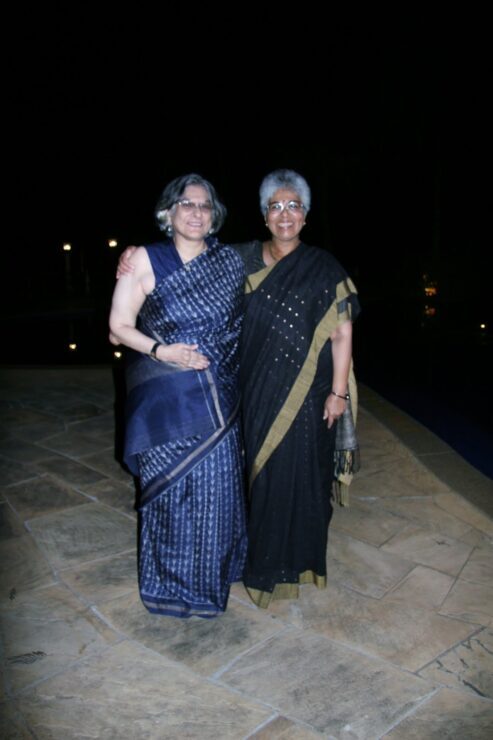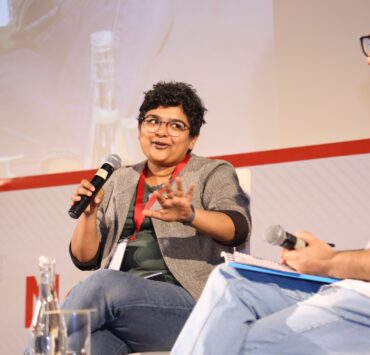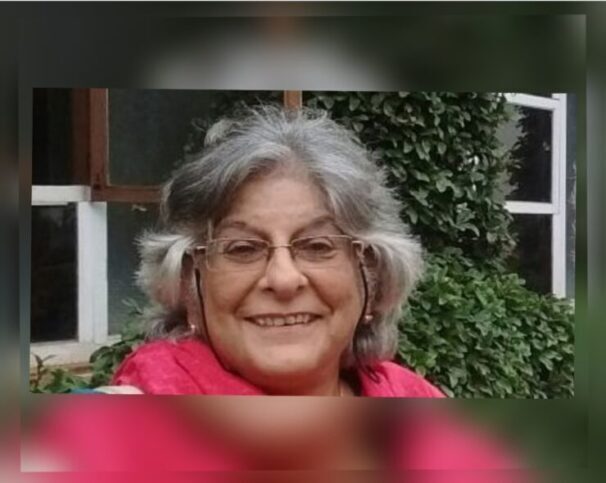
By Editors

Sherna Gandhy was a well-known journalist based in Mumbai and, for some years, in Pune. She was also a long-time member of the Network of Women in Media, India. Sherna passed away on 28 April 2023 after several years of battling cancer with remarkable fortitude and forbearance (obituaries can be accessed here and here).
During her long and distinguished career she worked with a number of leading publications (mainly print but eventually also digital): Eve’s Weekly, The Illustrated Weekly of India, Gentleman, The Observer of Business and Politics, Pune Times and The Times of India – Pune edition, InfochangeIndia, Rediff and Deccan Chronicle.
Sherna was primarily an editor (par excellence), renowned and revered for her formidable prowess as one. She not only improved all copy that went through her hands but also, evidently, helped editors on her various teams, as well as writers she worked with, to hone their skills (three of her “mentees” pay homage to her here). She was respected and appreciated for her sterling leadership qualities and management style, too: always insistent on hard work and the pursuit of excellence, but at the same time also warm, friendly, funny, caring and empathetic. Her output as a writer was relatively limited due to her preoccupations as an editor, but her articles (some can be accessed here) were also true to character: forthright and to the point, mincing no words.
As important as her professional virtues and achievements, however, was her unique and endearing personality, which made a lasting impression on virtually everyone who came across her – casual acquaintances as much as colleagues and friends. This was more than evident in the spontaneous outpouring of fond memories and affectionate stories that followed the sad news of her passing.
The NWMI pays tribute to Sherna Gandhy with these reminiscences shared by several network members who knew her.
My first encounter with Sherna was when I joined the hallowed Illustrated Weekly of India in the late 1980s. She handed me back the snippety column that I had edited with three bits circled in pen. Somewhat proud of my editing and proofreading skills, I was taken aback and, without even reading what she had circled properly, went to her desk to confirm. Once there, realisation dawned and I was like… uh-oh. I still remember Sherna’s amused expression. But on another occasion when, dictionary in tow, I hesitantly pointed out a mistake in what she had corrected, she accepted it wholeheartedly and graciously, unlike many editors with Himalayan egos. That slightly stern exterior hid a gentle, generous core.
If I had to think of one word that sums up Sherna as a professional, it would be “low-key”. Staying in the background and doing excellent work was her superpower, and it was something she did throughout her career. She had no desire to flaunt anything. That was something that stood out back then and particularly stands out today in the social media-dominated world of manipulation, self-promotion and overarching greed for approval. She also exuded integrity and forthrightness, whether she was dealing with high-flying editors or her juniors. Decency is an underrated word today, but for some of us it remains paramount, and Sherna personified it.
Indeed, “low-key” was a trait of her personal life, too. In 2016, when some of the Weekly gang met for lunch, someone mentioned that Sherna had been through breast cancer the previous year. When I looked at her, she shrugged it off, saying she was fine now. Fast-forward to May 2020 — my sister had just passed away from the dreaded disease, and I received a condolence message from Sherna, in which she mentioned that she was “in the same boat”. Concerned, I asked her what she meant but she didn’t reply. It was another friend who told me that her cancer had recurred.
After that, I spent a few months trying to persuade Sherna to complement her cancer treatment with alternative therapies, which had helped my sister. She was sceptical of non-mainstream healing methods, but graciously went along, promising to give it a thought. Then I got Covid, and she would enquire after my health constantly, sending me worried messages if I didn’t reply for a couple of days. The point needs no underlining but nevertheless: she had metastatic cancer while I merely had Covid but her concern was all directed towards my health. It was deeply touching and really brought out the kind of person she was.
By a strange coincidence, Sherna passed away on the same date that my sister had three years earlier. At her funeral, her face radiated peace and I could swear she had a smile on her lips. Rest in peace, my mentor — it was a privilege to know you.
~ Radha Rajadhyaksha
Radha Rajadhyaksha was Senior Editor, The Times of India, and columnist at The Hindu. She currently works for Hindustan Times.
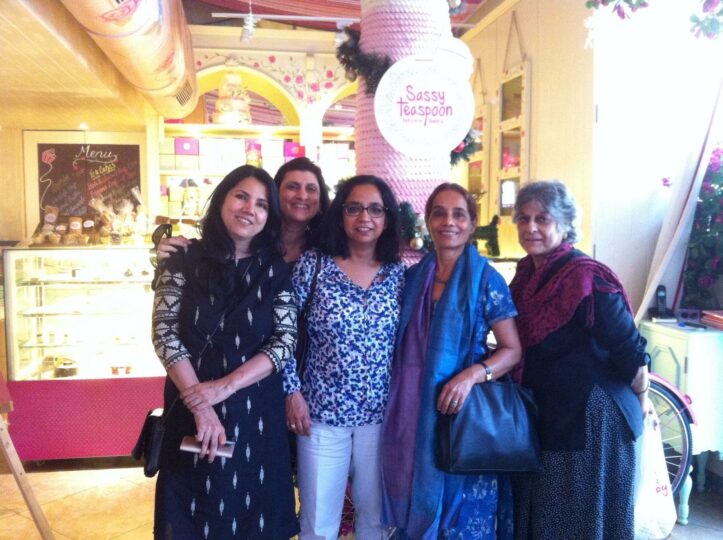
♣
Sherna and I worked on the same floor in The Times of India for a while, before I got to know her well. Even then, what struck me was that in all the cacophony of deadline hysteria, she managed to be the calm, still centre of the storm – unflappable, very firm, acidulous to pretenders, unfailingly kind to those who wanted to learn.
In Pune, where she transferred, I stayed with her and our views on everything journalism just synched amazingly. We admitted we were tired of all the mediocrity but while I was vindictive, she was much gentler.
Later, the courage with which she accepted the diagnosis of cancer humbled me. She was fearless. I cannot say I miss her. I talk to her as if she is still here. She was a being in million. I am fortunate to have had her in my life.
~ Carol Andrade
Carol Andrade is a former journalist who is now a full-time media educator as Dean, St. Paul’s Institute of Communication Education, Bandra, Mumbai.
♣
Whenever I thought of Sherna Gandhy, I remembered her as heading the desk team at the prestigious The Illustrated Weekly of India. I was in awe of the magazine and of her. We were newbies and she came across as formidable but forthright and fair. Later I got to know her through my contemporaries like Meher Marfatia, who was close to her. I knew she was respected for her extreme professionalism, for being a very fine editor. Many years later, I caught up with her to ask for help and she willingly recommended me for a job. I was happy I met her a few years ago, with Meher and Ammu Joseph, when she was on a visit to Bengaluru. I always found her warm and intelligent, with a droll sense of humour. I feel a pang that I had not kept in touch with her over the years. You don’t get to befriend people like her anymore. RIP Sherna.
~ Kavitha Shanmugam
Kavitha Shanmugam is a senior journalist currently working as a Senior Editor for the news website, The Federal.
♣
Sherna was already a legend by the time I worked with her in Gentleman magazine in the Bombay of the early 1990s. Her editing skills and her strict disciplinary attitude were both revered and seen as something of an anomaly. But there was so much to learn, even for those of us who were a bit younger and felt that we already knew everything.
It was outside office hours and after we stopped working together that the real Sherna emerged: fun, irreverent, gurgling laughter at everyone’s jokes, with lots of stories about people she had worked with. This was the Sherna who emerged in her later columns, and the Sherna that I will always love and remember.
~ Ranjona Banerji
Ranjona Banerji is an independent journalist who writes on media, gender and politics.
♣
What was so special about Sherna? Why did everyone who came in touch with her become a friend? Was it her warmth and willingness to listen to you? Was it her acerbic wit and forthright views? It was all this and more.
Sherna and I had offices close to each other when she was in the Observer of Business and Politics and I was in the Sunday Observer. We knew each other earlier, too, as fellow journalists in Bombay and as members of the NWMI, but this was the time I got to know her better. Her room in the Observer office was often privy to confidential discussions on work issues and strategies to ward off touchy-feely men!
When I think back on those days, I see Sherna, immaculate in a saree, salt and pepper hair framing a gracious smiling face, her typing interrupted by my arrival. I was always impressed by how fast she could type even though arthritis had affected her hands.
Arthritis was not the only affliction Sherna faced with graciousness and stoic calm. She battled cancer and personal tragedy till the very end. I will always cherish the time I spent with her and be inspired by her courage and fortitude.
~ Anjali Mathur
Anjali Mathur is a veteran journalist, founder member of the NWMI, and CEO of The Information Company, a content agency.
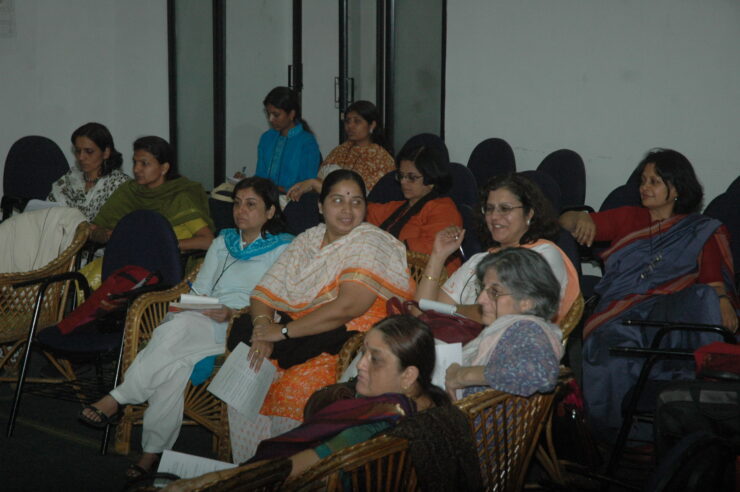
♣
The first time I met Sherna Gandhy was at the office of Bombay Times; the year was 1996. I was a rookie journalist and had just completed my internship with The Times of India, when I was informed that I should go to meet her in the fifth floor office.
It is not easy to forget Sherna – the way she turned in her chair, with her glasses sliding down the bridge of her nose and a smile, asking me what would I like to write on. Those words were enough to make any newcomer feel welcome, do away with all inhibitions, speak with confidence and discuss story ideas freely.
She was always encouraging and introduced me to very interesting pointers on what makes a good feature story. She was an absolutely perfect editor who was kind to freelancers – always eager to listen to your ideas and help make them better.
I met her later in Pune, too, when she was launching Pune Times but, alas, did not get a chance to work with her then. But she never forgot me and we often tried to speak over the phone. I am always grateful to her for showing me that perseverance pays. She helped me fall in love with features.
~ Prachi Bari
Prachi Bari is an independent journalist, film maker and researcher/fixer, currently studying towards a Masters in Society, Communications and Media at Charles University, Prague, Czech Republic.
♣
It was 1998 when I shifted my base from Aurangabad to Pune. I was new to the city and joined Lokmat as they were starting an edition from Pune. I was excited to be in a bigger city but had my own anxieties about it. I was trying to develop my sources as a reporter and also trying to make friends in the field. Some of the people I encountered were nice and helpful and a few others were somewhat reserved. I used to be a little apprehensive about meeting seniors from other media houses.
One day I got an opportunity to go on an overnight trip as a media representative – a developer was establishing a club. I was praying that some people would be there with whom I could be comfortable. Thankfully one of my media friends was coming along.
When we reached the facility outside Pune, I met Sherna Gandhy – a very pleasant-looking lady who was the editor of Pune Times. I went up to her and introduced myself. She shook hands with me and that first touch itself was so warm and reassuring. Her body language was friendly and welcoming. She curiously enquired about my experience of Pune, the beats I was covering, my special stories – and she listened with full attention. The entire conversation was so encouraging for me, having come from a smaller town and working in regional language media. After a dinner around a camp fire we went to our respective rooms. The next morning, at the crack of dawn, we met again, while I was out for a morning walk. The intense chat we had then, too, was refreshing.
There were no cell phones in those days. But we met a few times afterwards – sometimes in the British Council Library which was bang opposite the Times of India office, sometimes at some fashion shows and other events and places. Each time she spoke very warmly. Later we lost touch. The last time I spoke to her must have been seven years ago. I was not aware that she had been diagnosed with cancer.
But when the news of her passing away came in recently, suddenly, in a flash, so many memories re-surfaced. Sherna Gandhy will forever be remembered as a most wonderful person. Rest in peace.
~ Pratibha Chandran
Pratibha Chandran is Bureau Chief Sahara Samay, Pune and Coach in Smartphone Filmmaking and MOJO.
♣
I heard about Sherna long before I met her. From friends who were training at The Illustrated Weekly of India, where she was reputed to be tough and formidable, dealing with temperamental editors as well as sloppy sub-editors with an iron hand. Looking back now, I realise she must have been barely 30 at the time. Already a legend.
Many years later, I joined her at The Times of India in Pune. The millennium had not yet turned. The city had not yet transformed into a prosperous metropolis. Sherna headed a team of young sub-editors and reporters, bringing out a slim city supplement from a pokey apartment. We shared an alcove. I chafed at the smallness of it all and left within months. Sherna stayed, ever the rock, until the supplement became a full-fledged edition.
Nothing was too small for Sherna. She gave a city supplement, an NGO report and, later, copy for a fledgling Infochangeindia.org, the web magazine I founded, the same attention she had given to India’s oldest and best-known English-language weekly magazine. And if anything about her was formidable, it was her editing skills. To get words and thoughts to cohere through a piece of writing was everything. And it was enough. Formidable also were the warmth and droll humour with which she managed her teams. Everyone seemed to confide in her; she seemed to know the ins and outs of every budding or wilting office romance, every rebellion against parental authority.
Through these last few trying years—the pandemic and social divisions and eroding human rights and freedoms—when so many of us struggled to maintain equilibrium, Sherna, despite her own serious illness and the tragedies in her family, seemed centred and cheerful. I don’t know how she did it.
~ Hutokshi Doctor
Hutokshi Doctor is an editor whose career has spanned mainstream print media and communications for social change.
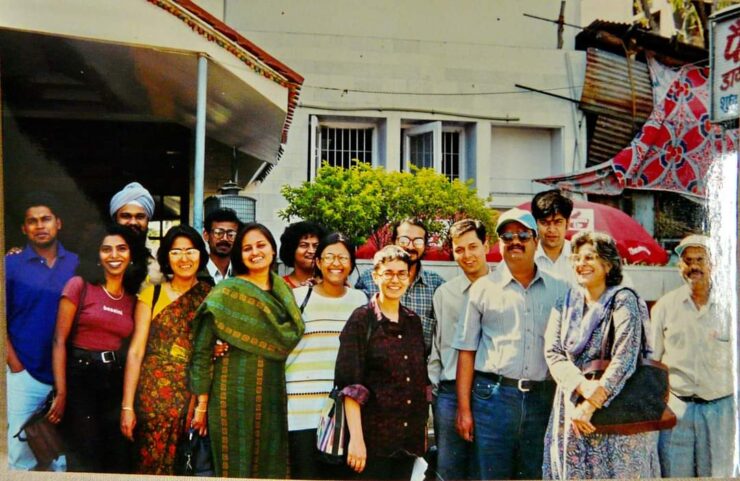
♣
I joined Eve’s Weekly after Sherna left for The Illustrated Weekly of India, and I joined the Illustrated Weekly after she left for elsewhere. And while we were colleagues in Infochangeindia for some time, we didn’t interact much on work. But I was always in awe of Sherna – her striking looks (and those saris!), her imposing manner, and the confidence with which she spoke. And, of course, about her perfectionism, she was the stuff of legend, a perfectionist terror, and I believed the stories of her flinging badly edited copy back at terrified subs. She was quite amused when I told her that many years later. She didn’t see herself as a terror, not at all.
~ Sandhya Srinivasan
Sandhya Srinivasan is a Mumbai-based independent journalist and researcher.
♣
Sherna and I were colleagues in Eve’s Weekly in the late 1970s – both recently back from studies overseas (she did her Master’s in English Literature at the University of Manchester), both around the same age and in our first real jobs. She sometimes said I was her first boss but I never saw it that way: we were comrades in arms as we tried our best to transform what used to be a traditional women’s magazine into one more in tune with the times in the early days of the contemporary women’s movement in India. In any case I could only have been a sous-boss since we both had an actual boss (Sherna’s article about our erstwhile editor, who was an early victim of Covid, is accessible here)! The two of us also bonded over our shared passion for (obsession with?) editing.
We overlapped at Eve’s only for a couple of years but remained close friends over the past four and a half decades, despite the fact that I moved to Bangalore three and a half decades ago. I remember we used to travel to work together in what was known as a “contract bus” during our EW days. My daughter and I also spent a lot of time at Rockdale, Sherna’s family home in Bandra, especially on the magical patio overlooking the garden and the sea. Her dynamic mother was always the hostess with the mostest and her gentle father was a wonderful guide to frogs and snails, if not puppy dog’s tails, for my little girl.
In more recent years we were in touch mainly – but regularly – on the phone, although time with Sherna was an essential part of my visits to Mumbai (most recently in December 2022). She was not an enthusiastic traveller at the best of times, but I treasure memories of the two trips she made over the past decade to spend time with us, including during the one year of complete remission she enjoyed after the cancer diagnosis.
It is amazing how little information there is about Sherna on the Internet, despite her stature as a senior, highly respected, widely admired and adored journalist who had held senior positions in a number of well-known publications in the course of her 44-year career. But then that is probably to be expected for a person who used the Internet mainly for work and stayed clear of social media, except for WhatsApping with friends. I recall her typically terse reply to my forwarded message about shutting off all communications for 12 hours in solidarity with Kashmiris facing prolonged lockdown/blackout in 2019: “I’m more than halfway there… Count me in.”
But maybe there is more to it than that. There is not a lot of information about Sherna offline either – beyond what remains in the hearts and minds of family, friends and colleagues. I realise now (too late) that Sherna was always more of a listener than a talker, even among friends. That rare quality made her a better journalist, of course, and also the go-to confidante for many colleagues and friends, including younger ones. It is only now, for example, that even very close friends are getting to know fascinating details about her childhood. I notice now that in the one personal essay I had a hand in getting her to write – for Kalpana Sharma’s 2019 book, Single by Choice – she made light of her own story and focused more on society and community. She must be one of the most understated individuals in my acquaintance.
I’m sure she’s even now raising her eyebrows and saying, “Enough already, Ammu!” So I’ll stop but can’t resist sneaking in this link.
~ Ammu Joseph
Ammu Joseph is an independent journalist and author based in Bangalore, who spent the first years of her career working with various publications and teaching journalism in Mumbai.
